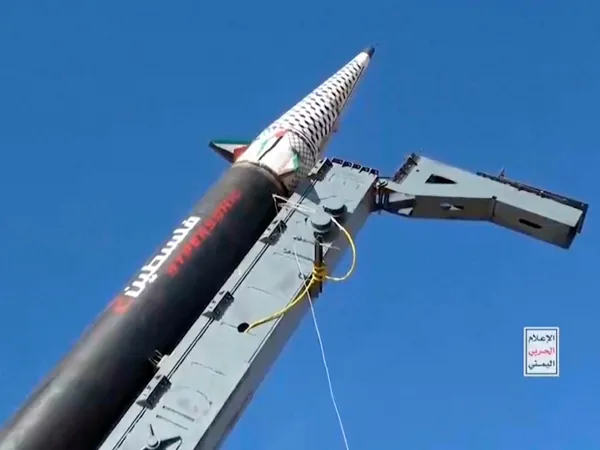
Yemen's Houthis Launch Groundbreaking Missile Attack on Israel: Key Insights Revealed!
2024-09-17
Yemen's Houthis Launch Groundbreaking Missile Attack on Israel
On Sunday, Yemen's Ansar Allah, commonly known as the Houthis, made headlines when they announced the launch of a missile purportedly designed to be hypersonic, targeting central Israel. This unprecedented strike ignited several fires, triggered air raid sirens, and sent residents scrambling for safety around Ben Gurion Airport.
The Houthis boasted about the missile's capabilities, claiming Israeli defense systems failed to intercept it. However, Israeli officials reported that nine individuals sustained minor injuries due to the debris from the missile.
What's the Deal with the Houthi Missile?
The missile, according to the Houthis, reportedly traveled a staggering 2,000 kilometers (approximately 1,240 miles) in just 11 minutes. Yet, Israeli sources disputed the hypersonic classification, suggesting the missile lacked the advanced maneuverability typical of hypersonic technology. Mohammed Al-Basha, a senior Middle East analyst, pointed out that without external support from nations like Russia or North Korea, the missile is more likely to be classified as supersonic, which is less advanced.
Al-Basha elaborated that while supersonic missiles rely on conventional rocket technology, hypersonic missiles require cutting-edge materials capable of withstanding extreme conditions. “To confirm hypersonic capability, we'd need tracking data to show it exceeded Mach 5,” he explained.
Analysts noted that the design of the missile closely resembles Iran's medium-range ballistic missile models, merging features from various designs and sporting distinct Houthi marks, including the black-and-white keffiyeh pattern.
Did Israel Manage to Intercept the Threat?
The Houthis claimed, through their media channels, that their missile successfully evaded any interception, asserting that Israeli defenses engaged but failed to destroy the missile. Israeli sources acknowledged that shrapnel from the missile and the defense systems caused a fire in an open area near Kfar Daniel, located just over 15 kilometers (nine miles) from the airport.
Israel's Response: What Happens Next?
Despite the panic caused by the initial strike, airport operations resumed shortly after. Prime Minister Benjamin Netanyahu reacted strongly, vowing that the Houthis would "pay a heavy price" for their actions, framing this incident as a part of a broader struggle against Iran and its allies. He invited critics to remember the Israeli military's past operations in Hodeidah, where multiple casualties were reported.
Analysts predict that Israel may respond with significant long-range air strikes targeting critical locations in Yemen or wide-reaching cyber operations aimed at disrupting Houthi command structures.
What Are the Houthis Aiming to Accomplish?
This attack represents the Houthis’ deepest strike into Israeli territory to date, marking a notable escalation in their capability to project military power. Al-Basha cited this increased range as indicative of advancements in missile technology, likely facilitated by Iranian support, raising alarms about potential vulnerabilities in Israel’s air defense systems.
The Houthis have so far conducted a total of over 220 missile and drone attacks against Israel in the past year, illustrating an ongoing military campaign that the group claims is in defense of Palestine. Houthi spokesman Yahya Saree hinted at future operations, linking them directly to Israel's ongoing military actions in Gaza as the anniversaries of these key events approach.
The Significance of This Attack
This missile attack is pivotal as it extends beyond previous reconnaissance, indicating a new level of operational capability for the Houthis. The success of the strike, despite Israel's sophisticated defenses, could squeeze the group’s ambitions and bolster their confidence in regional power dynamics. Yemen analyst Nicholas Brumfield emphasized that it allows the Houthis to assert their role in the resistance against Israeli actions in Gaza, thereby enhancing their stature as a key player in the ever-evolving geopolitical landscape of the Middle East.
With tensions escalating, the world watches closely to see how this encounter will unfold and what it will mean for the broader conflict involving Israel, Palestine, and their neighboring adversaries.


 Brasil (PT)
Brasil (PT)
 Canada (EN)
Canada (EN)
 Chile (ES)
Chile (ES)
 España (ES)
España (ES)
 France (FR)
France (FR)
 Hong Kong (EN)
Hong Kong (EN)
 Italia (IT)
Italia (IT)
 日本 (JA)
日本 (JA)
 Magyarország (HU)
Magyarország (HU)
 Norge (NO)
Norge (NO)
 Polska (PL)
Polska (PL)
 Schweiz (DE)
Schweiz (DE)
 Singapore (EN)
Singapore (EN)
 Sverige (SV)
Sverige (SV)
 Suomi (FI)
Suomi (FI)
 Türkiye (TR)
Türkiye (TR)